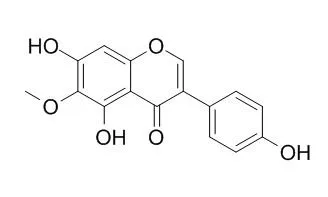| Cell Research: |
| Pharmacol Rep. 2015 Apr;67(2):382-7. | | Tectorigenin ablates the inflammation-induced epithelial-mesenchymal transition in a co-culture model of human lung carcinoma.[Pubmed: 25712668] | Tumors not only manage to escape from the host immune system, but they effectively contrive to benefit from infiltrating immune cells by modifying their functions so as to create a pro-inflammatory microenvironment favorable for tumor progression and metastasis. In this study we investigated if Tectorigenin could suppress lung cancer-induced pro-inflammatory response generated from monocytes.
METHODS AND RESULTS:
A549:THP1 co-culture model was set-up favoring release of pro-inflammatory cytokines interleukin (IL)-6 and tumor necrosis factor alpha (TNF-α). Effect of Tectorigenin on A549 imparted invasive phenotype of A549:THP-1 co-culture was monitored by cytokine release from monocytes, and metastasis/epithelial-mesenchymal transitiom (EMT) in A549 cells. In a contact A549:THP1 co-culture model, THP-1 cells were activated by A549 cells favoring secretion of pro-inflammatory cytokines, TNF-α and IL-6. However, priming of A549 cells with Tectorigenin for 24h repressed A549 cell-induced secretion of TNF-α and IL-6 by THP-1 cells. Tectorigenin induced change in functional phenotype of A549 cells rendered THP-1 cells non-responsive for the secretion of IL-6 and TNF-α in a contact co-culture setup. Additionally, conditioned media from this non-responsive A549:THP-1 co-culture suppressed metastatic potential of A549 cells as confirmed by the wound healing and transwell migration assays. These finding were further corroborated by decrease in expression of Snail with a concomitant increase in E-cadherin, the two signature markers of EMT.
CONCLUSIONS:
These results clearly demonstrate the therapeutic potential of Tectorigenin to prevent lung cancer elicited inflammatory and pro-metastatic response in monocytes and warrants further investigations to elucidate its mechanism of action. | | Carcinogenesis. 2012 Dec;33(12):2488-98. | | Tectorigenin sensitizes paclitaxel-resistant human ovarian cancer cells through downregulation of the Akt and NFκB pathway.[Pubmed: 23027625 ] | Paclitaxel (Taxol) is currently used as the front-line chemotherapeutic agent for several cancers including ovarian carcinoma; however, the drug frequently induces drug resistance through multiple mechanisms. The new strategy of using natural compounds in combination therapies is highly attractive because those compounds may enhance the efficacy of chemotherapy.
METHODS AND RESULTS:
In this study, we found that Tectorigenin, an isoflavonoid isolated from flower of Pueraria thunbergiana, enhanced the growth-inhibitory effect of paclitaxel in paclitaxel-resistant ovarian cancer cells (MPSC1(TR), A2780(TR) and SKOV3(TR)) as well as their naive counterparts. The combination of Tectorigenin with paclitaxel resulted in a synergistic apoptosis compared with either agent alone through activation of caspases-3, -8 and -9. Treatment with Tectorigenin inhibited the nuclear translocation of NFκB and the expression of NFκB-dependent genes such as FLIP, XIAP, Bcl-2, Bcl-xL and COX-2, which are known to be associated with chemoresistance. In addition, the Tectorigenin-paclitaxel combination inhibited the phosphorylation of IκB and IKK and the activation of Akt in paclitaxel-resistant cancer cells. Moreover, Tectorigenin-paclitaxel-induced cell growth inhibition was enhanced by pretreatment with the Akt inhibitor LY294002 or overexpression of the dominant negative Akt (Akt-DN), but reduced by overexpression of constitutively activated Akt (Akt-Myr). Furthermore, we found that Akt-Myr, at least in part, reversed Tectorigenin-paclitaxel-induced nuclear translocation of NFκB and the phosphorylation of IκB and IKK.
CONCLUSIONS:
These data suggest that Tectorigenin could sensitize paclitaxel-resistant human ovarian cancer cells through inactivation of the Akt/IKK/IκB/NFκB signaling pathway, and promise a new intervention to chemosensitize paclitaxel-induced cytotoxicity in ovarian cancer. |
|
| Animal Research: |
| J Pharmacol Sci. 2005 Apr;97(4):541-4. | | Hepatoprotective effect of tectoridin and tectorigenin on tert-butyl hyperoxide-induced liver injury.[Pubmed: 15821336] | To clarify the hepatoprotective effects of tectoridin and Tectorigenin from Puerariae Flos, their effects on tert-butyl hyperoxide (t-BHP)-injured HepG2 cells and mice were investigated.
METHODS AND RESULTS:
When Tectorigenin at a dose of 50 mg/kg was intraperitoneally administered to mice injured by t-BHP, it significantly inhibited the increase the activities of plasma ALT and AST by 39% and 41%, respectively, in the t-BHP-treated group. The inhibitory effect of Tectorigenin is much more potent than that of a commercially available dimethyl diphenyl bicarboxylate. Orally administered tectoridin showed hepatoprotective activity. However, when tectoridin was intraperitoneally administrated to mice, no hepatoprotective activity was observed. Tectorigenin also protected against the cytotoxicity of HepG2 cells induced by t-BHP. This protection may have originated from the inhibition of apoptosis.
CONCLUSIONS:
Tectorigenin may be hepatoprotective and tectoridin should be a prodrug that is transformed to Tectorigenin. |
|






 Cell. 2018 Jan 11;172(1-2):249-261.e12. doi: 10.1016/j.cell.2017.12.019.IF=36.216(2019)
Cell. 2018 Jan 11;172(1-2):249-261.e12. doi: 10.1016/j.cell.2017.12.019.IF=36.216(2019) Cell Metab. 2020 Mar 3;31(3):534-548.e5. doi: 10.1016/j.cmet.2020.01.002.IF=22.415(2019)
Cell Metab. 2020 Mar 3;31(3):534-548.e5. doi: 10.1016/j.cmet.2020.01.002.IF=22.415(2019) Mol Cell. 2017 Nov 16;68(4):673-685.e6. doi: 10.1016/j.molcel.2017.10.022.IF=14.548(2019)
Mol Cell. 2017 Nov 16;68(4):673-685.e6. doi: 10.1016/j.molcel.2017.10.022.IF=14.548(2019)